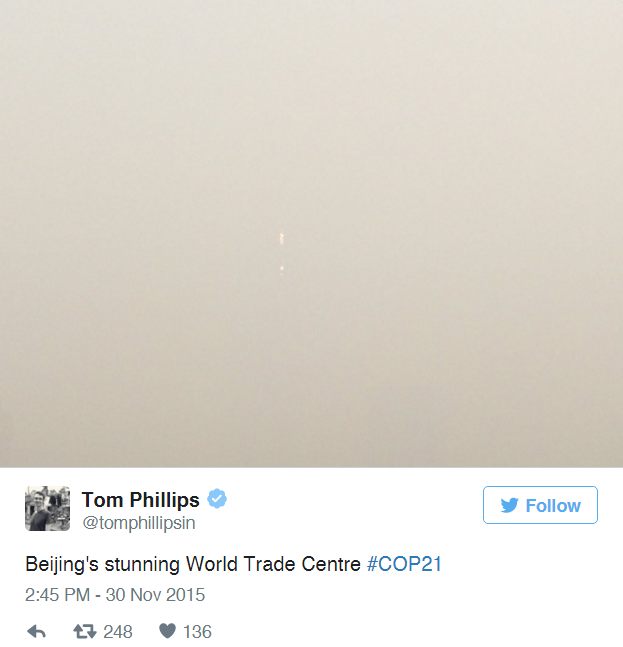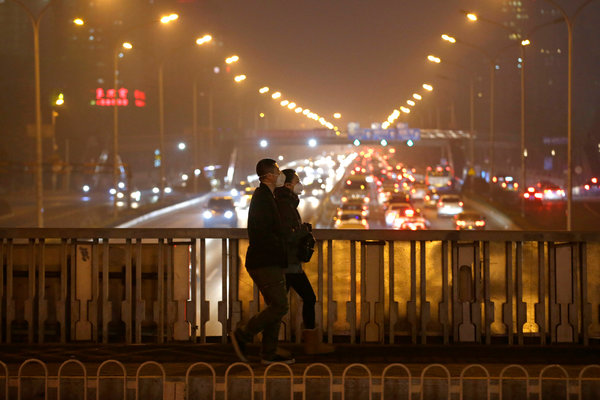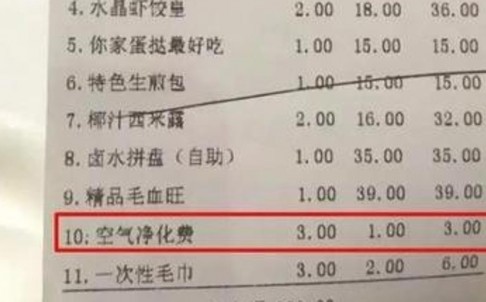Beijing's Air Is So Bad, People Are Buying Bottled Air From The Mountains Of Canada
And a restaurant is charging customers for clean air.
In fact, it kills about 4,400 people in China every single day
Researchers from Berkeley Earth, a California-based climate research organization, calculated that about 1.6 million people in China die every year from health issues caused by the country’s notoriously polluted air.
According to the study, more than one-third of the Chinese population regularly breathe air that would be considered “unhealthy” by U.S. standards.
"It's a very big number," the study's lead author, Robert Rohde, told The Associated Press. "It's a little hard to wrap your mind around the numbers."
On 7 December, officials in Beijing declared that the thick smog blanketing the city was bad enough to require a red alert, the first time they had raised the alarm to its highest level since an emergency air-pollution response system was announced in 2013
Chinese cities, especially northern ones, have some of the world’s worst air pollution. Most of it comes from industrial coal burning, and some from motor vehicles. The leaders in Beijing can ensure clear skies by ordering factories to shut down, but they have done so only during international summit meetings here and signature events like the military parade on Sept. 3 for the victory over Japan in World War II.
To show just how bad Beijing's air has become, one man decided to make a brick out of it. He walked around Beijing with a vacuum cleaner a few hours every day sucking the smog out of the city's air.
On 30 November 2015, after 100 days of collecting smog, the 34-year-old Chinese artist Wang Renzheng -- known artistically as Jianguo Xiongdi, or "Nut Brother" -- took the gunk that built up in his vacuum, mixed it with some clay, and baked it into a brick, The Huffington Post reported.
"I want to show this absurdity to more people," Renzheng explained.
Moreover, on 14 December, it was reported that a restaurant in Beijing started capitalising on the issue by charging its customers one yuan per person to for the privilege of breathing filtered air
Patrons who dined in the restaurant were unknowingly about to pay for the operational costs, and only found out when they were handed the bill at the end of their meals, according to the South China Morning Post.
A charge of one yuan per customer was added to the food bill, about 10p or $0.15. Customers complained to the local government, who ordered the restaurants owners to halt the illegal charge. A city official told Xinhua news agency that it was not the diners’ choice to breathe filtered air and therefore it could not be sold as a commodity.
However, the charge was supported on social media, where many said they would happily pay one yuan to be able to breathe easily.
On Weibo, China’s version of Twitter, one user said: “They could have added the extra one yuan to the price of the dishes but they didn’t… there is nothing wrong with charging this extra fee. The kind of dining environment decides the kind of pricing.”
If that's surprising to you, wait till you read what a Canadian company is doing. Called Vitality Air, the company is literally selling bottles of fresh air in China by canning oxygen from the Rocky Mountains of Canada, priced for over USD15 a bottle.
It may have started out in jest, but two Canadians are now profiting off a smog "red alert" in Beijing, as Chinese people are buying canisters of fresh air from the Rocky Mountains, reported VICE News.
If that sounds like a joke, that's because it was at first
The founders sold a Ziploc bag of air for 99 cents as a gag in 2014. But when they tried again, the second bag went for more than USD160, which proved to the company that there's a market for clean air in some parts of the world.
"The way we capture the air now is a bit of a trade secret," Paquette, who goes down to Banff and Lake Louise from Edmonton, Alberta to fill giant cans with air through clean compression, and brings it home to bottle it, told VICE News.
"As much as it started out as a novelty idea, with the really bad smog they've had in Beijing, we're finding people are buying it as more than just a novelty, but for everyday use" he says. "There's been quite a demand."
The company told The Telegraph it sold its first shipment of 500 bottles in four days, and after the smog alert issued in Beijing last week there are thousands more being shipped to China now




